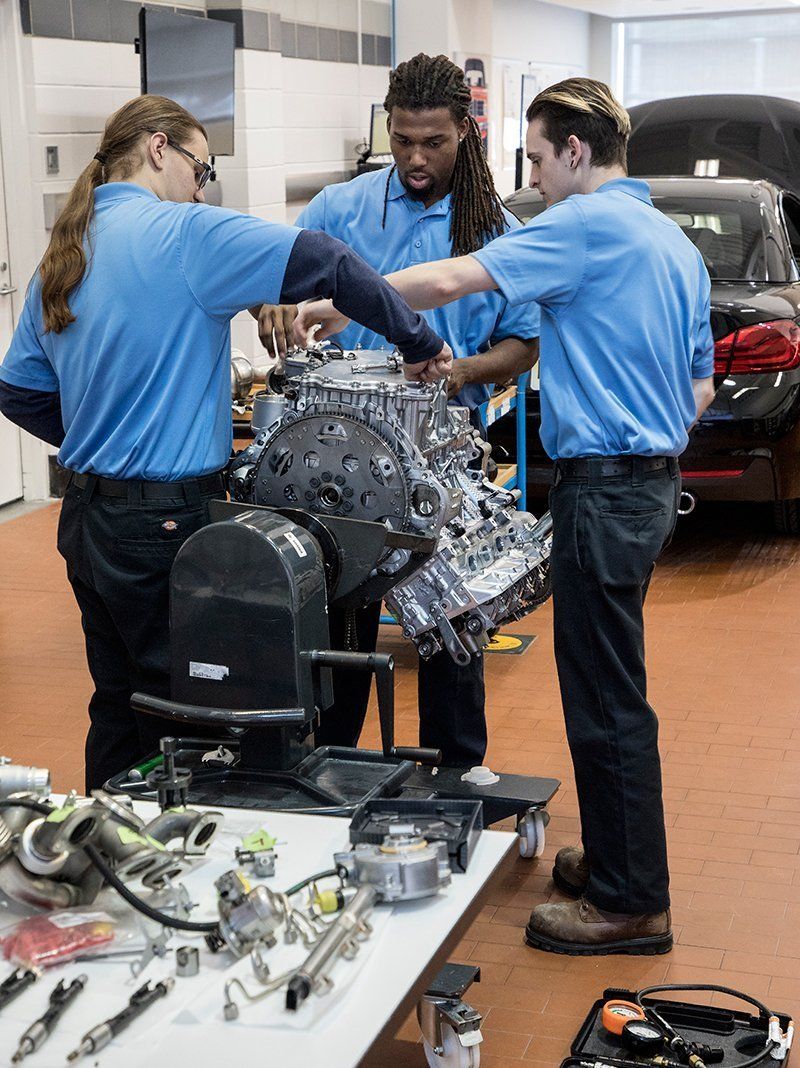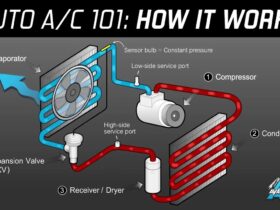How Much Do Automotive Technicians Make: Insider Insights an average annual salary of around $44,000, with variations based on location, experience, and employer. The automotive industry offers diverse career paths, from entry-level positions to specialized roles, providing opportunities for growth and advancement.
As a vital part of the automotive industry, technicians play a crucial role in ensuring the functionality and safety of vehicles. Their expertise in diagnosing, repairing, and maintaining automotive systems is in high demand. With the increasing complexity of modern vehicles, the demand for skilled technicians continues to rise.
This comprehensive guide will explore the factors influencing automotive technician salaries, the highest paying automotive technician jobs, and the potential for career development within this dynamic field. Whether you’re considering entering the automotive industry or seeking to advance your career as a technician, understanding the earning potential and opportunities available is essential for informed decision-making.
Table of Contents
Introduction To How Much Do Automotive Technicians Make: Insider Insights
Automotive technicians play a crucial role in keeping vehicles running smoothly. They are highly skilled professionals who diagnose, repair, and maintain automobiles. One of the key aspects that individuals consider when pursuing a career in automotive technology is the earning potential.
Salary Ranges Across The Us
Salaries for automotive technicians can vary significantly across the United States. In general, the average annual salary for an automotive technician in the US ranges from $40,000 to $70,000. However, factors such as location, experience, and specialization can influence these figures.
Factors Influencing Technician Salaries
- Location: Technicians in high-cost-of-living areas tend to earn higher salaries.
- Experience: Seasoned technicians with years of experience typically command higher pay.
- Specialization: Those with specialized skills in areas like hybrid or electric vehicles may earn more.
- Certifications: Holding certifications from organizations like ASE can lead to higher pay.
Salary Comparisons By Region
Discover the salary differences for automotive technicians across regions to see how much they make. From Austin, Texas to other parts of the United States, explore the varying earning potential in this field.
Salary Comparisons by Region When it comes to choosing a career as an automotive technician, one of the most important factors to consider is the salary. Automotive technicians can earn different salaries depending on various factors, including the region they work in. In this section, we will explore the salary comparisons by region to help you understand how much you can earn as an automotive technician in different areas.
Earnings in urban vs rural areas One of the biggest factors that can affect the salary of an automotive technician is the location they work in. Generally, technicians who work in urban areas tend to earn more than those who work in rural areas. This is because there is more demand for automotive services in urban areas, which means technicians can charge higher rates for their services. In addition, urban areas often have more high-end vehicles that require more complex repairs, which can also lead to higher earnings.
State-by-state breakdown Another important factor that can impact the salary of an automotive technician is the state they work in. Salaries can vary significantly from state to state due to differences in the cost of living, demand for automotive services, and other factors. Here is a state-by-state breakdown of the average annual salary for automotive technicians in the United States, according to the Bureau of Labor Statistics: – California: $49,020 – Texas: $42,800 – Florida: $40,940 – New York: $46,540 – Pennsylvania: $42,820 – Ohio: $42,350 – Illinois: $44,830 – Michigan: $43,010 – Georgia: $41,770 – North Carolina: $41,220 It’s important to note that these figures are averages and can vary depending on factors such as experience, education, and certifications.
In conclusion, when it comes to earning a salary as an automotive technician, location matters. Technicians working in urban areas tend to earn more than those in rural areas, and salaries can also vary significantly from state to state. By considering these factors, you can make an informed decision about where to work as an automotive technician and what kind of salary you can expect.
The Impact Of Experience And Education
Pay Differences For Entry-level Vs Experienced Technicians
Entry-level automotive technicians typically start at a lower pay rate compared to experienced technicians.
As technicians gain more experience and skills, their pay increases significantly.
Advanced Certifications And Their Effect On Income
Obtaining advanced certifications such as ASE can lead to higher income opportunities for automotive technicians.
Technicians with specialized certifications often command higher salaries due to their expertise.
Specialization And Earnings
Automotive technicians can significantly increase their earnings by specializing in high-demand areas within the industry. Niche expertise and specialized skills often lead to higher salaries and greater job opportunities.
Niche Expertise And Salary
Specializing in niche areas within the automotive industry can lead to higher earning potential. Technicians with expertise in specific fields such as hybrid and electric vehicles, diesel engines, or advanced diagnostic systems are often in high demand and can command higher salaries.
Here’s a breakdown of average annual salaries for automotive technicians based on their specialization:
| Specialization | Average Annual Salary |
|---|---|
| Hybrid and Electric Vehicles | $60,000 – $80,000 |
| Diesel Engines | $50,000 – $70,000 |
| Advanced Diagnostic Systems | $55,000 – $75,000 |
High-demand Automotive Specialties
Several high-demand specialties in the automotive industry offer lucrative earning potential for technicians. These specialties are often sought after by employers and can lead to rewarding career paths.
- Performance Tuning: Technicians specializing in performance tuning and aftermarket modifications can earn substantial incomes, especially in the enthusiast and racing communities.
- Advanced Diagnostics: With the increasing complexity of modern vehicles, technicians proficient in advanced diagnostic systems and computerized vehicle control systems are highly valued and can command higher salaries.
- Specialized Maintenance: Specializing in specific vehicle systems such as transmissions, brakes, or HVAC systems can lead to higher-paying positions within dealerships and specialty repair shops.
Dealership Vs Independent Shop Salaries
When it comes to the world of automotive technicians, one of the most pressing questions is the disparity in earnings between those who work at dealerships and those at independent shops. Let’s delve into the comparative earnings of these two sectors and explore the income potential in independent garages.
Comparative Earnings: Dealership Technicians
Dealership technicians often enjoy a more stable income, typically receiving a base salary with the potential for bonuses based on performance metrics such as customer satisfaction and productivity. On average, dealership technicians earn a median annual salary of $42,090, according to the Bureau of Labor Statistics (BLS).
Income Potential In Independent Garages
On the other hand, independent shop technicians have the potential to earn higher incomes due to the opportunity for performance-based pay and the possibility of building a loyal clientele. Their earnings may vary based on factors such as the shop’s location, reputation, and the technician’s level of expertise. According to the BLS, the median annual salary for independent automotive technicians is approximately $40,710.

Credit: www.neit.edu
Additional Income Opportunities
Automotive technicians have various opportunities to increase their income beyond their base salary. Here are some common ways technicians can earn additional income:
Overtime And Bonuses
Many automotive technicians have the option to work overtime hours, especially during busy seasons or when there is a high demand for their services. Overtime pay is typically higher than regular hourly rates, providing technicians with a chance to boost their earnings. In addition to overtime, some employers offer performance-based bonuses to reward technicians for their hard work and dedication.
Side Jobs And Freelance Work
Another way automotive technicians can increase their income is by taking on side jobs or freelance work outside of their regular employment. This can include providing services to friends, family, or local customers in need of automotive repairs or maintenance. By leveraging their skills and expertise, technicians can earn extra money in their spare time while helping others with their vehicle needs.
Benefits And Perks Beyond The Paycheck
When it comes to considering a career as an automotive technician, salary is an important factor to consider. However, it’s also important to look beyond the paycheck and consider the benefits and perks that come with the job. In this post, we’ll explore some of the benefits and perks automotive technicians can enjoy beyond their salary.
Healthcare And Retirement Plans
One of the most important benefits that automotive technicians can enjoy is access to healthcare and retirement plans. Many employers offer comprehensive healthcare plans that cover medical, dental, and vision expenses. Additionally, many employers offer retirement plans, such as 401(k) plans, that allow technicians to save for their future.
Having access to healthcare and retirement plans can provide peace of mind and financial security for automotive technicians and their families.
Training And Development Benefits
Another important perk of being an automotive technician is access to training and development benefits. Many employers offer opportunities for technicians to attend training programs and earn certifications, which can help them advance their careers and increase their earning potential.
Additionally, some employers offer tuition reimbursement programs that can help technicians pursue additional education or training outside of work.
By investing in their employees’ training and development, employers can help automotive technicians build successful careers and stay up-to-date with the latest industry trends and technologies.
Other Perks
Aside from healthcare, retirement, and training benefits, there are other perks that automotive technicians can enjoy. For example, some employers offer flexible schedules or remote work options, which can help technicians maintain a healthy work-life balance.
Additionally, some employers offer paid time off, employee discounts, and other incentives that can make the job more rewarding.
While salary is an important consideration when choosing a career as an automotive technician, it’s important to look beyond the paycheck and consider the benefits and perks that come with the job. From healthcare and retirement plans to training and development benefits and other incentives, there are many reasons why being an automotive technician can be a rewarding and fulfilling career choice.

Credit: m.youtube.com
Job Outlook And Industry Trends
As the automotive industry continues to evolve, the job outlook for automotive technicians remains robust. Employment projections for technicians show steady growth in demand for skilled professionals in this field.
Employment Projections For Technicians
According to industry experts, the demand for automotive technicians is expected to increase in the coming years. This growth can be attributed to the increasing complexity of modern vehicles, leading to a greater need for specialized skills and expertise.
- Steady growth in demand for automotive technicians
- Increasing complexity of modern vehicles
- Greater need for specialized skills and expertise
Technological Advancements And Job Security
Technological advancements play a crucial role in shaping the job security of automotive technicians. With the integration of advanced diagnostic tools and computerized systems in vehicles, technicians must continually update their skills to stay relevant in the industry.
- Continuous need for skill updates due to technological advancements
- Integration of advanced diagnostic tools and computerized systems
- Importance of staying relevant in the ever-evolving automotive industry
Geographical Hotspots For Top Earnings
Discover the geographical hotspots for top earnings in the automotive technician industry. Austin, Texas, stands out as a prime location for lucrative opportunities in this field, with competitive salaries and a range of high-paying job prospects.
Cities And States With The Highest Pay
When it comes to finding the top-paying locations for automotive technicians, certain cities and states stand out for offering lucrative earning opportunities. Let’s explore the geographical hotspots where automotive technicians can command top salaries.
Cost Of Living Considerations
It’s important to consider the cost of living in different areas when evaluating automotive technician salaries. A high salary may not necessarily translate to a high standard of living if the cost of living is also high. Considering the cost of living is crucial for making informed decisions about where to work as an automotive technician.

Credit: www.caranddriver.com
Navigating Your Automotive Technician Career
Explore the earning potential in the automotive technician career. Discover the average salaries in Texas and at dealerships, along with annual and hourly rates. Uncover the differences between mechanic and technician roles to make informed career decisions.
Building A Lucrative Career Path
Embarking on a career as an automotive technician offers numerous opportunities for growth and advancement. By continuously honing your skills and staying updated on the latest technologies, you can pave the way for a prosperous career trajectory.
Negotiating Salaries And Raises
When it comes to negotiating your salary and seeking raises as an automotive technician, it’s crucial to highlight your expertise, experience, and the value you bring to the team. Conduct thorough research on industry standards and confidently advocate for fair compensation.
Frequently Asked Questions
What Is The Highest Paid Auto Technician?
The highest paid auto technicians are master mechanics, car tuners, and ASE certified technicians. These professionals have specialized skills and experience, leading to higher salaries.
What Is The Highest Salary For A Technician?
The highest salary for a technician can vary but can reach up to six figures annually.
What Is The Difference Between A Mechanic And An Automotive Technician?
Mechanics primarily focus on hands-on work, such as oil changes and brake repairs. Automotive technicians, on the other hand, specialize in electrical diagnosis and identifying drivability issues, in addition to performing mechanical work.
Is Being A Mechanic Stressful?
Being a mechanic can be stressful, with an above-average amount of stress. It’s a roller coaster of highs and lows.
Conclusion
Automotive technicians have diverse earning potential based on experience and location. Specialized roles like master mechanics or alignment specialists often command higher salaries. Understanding the differences between mechanic and technician roles can help individuals pursue a rewarding career in the automotive industry.















Leave a Reply